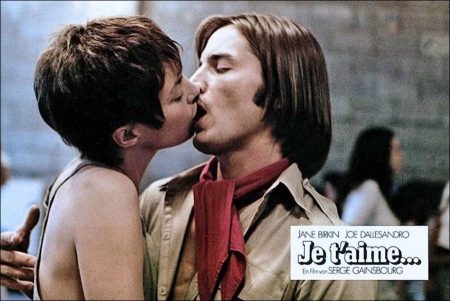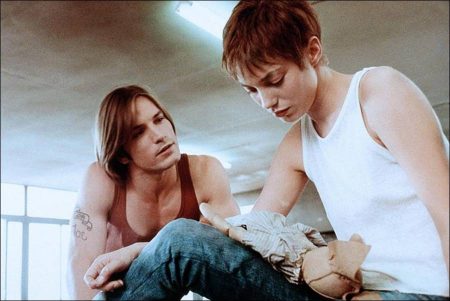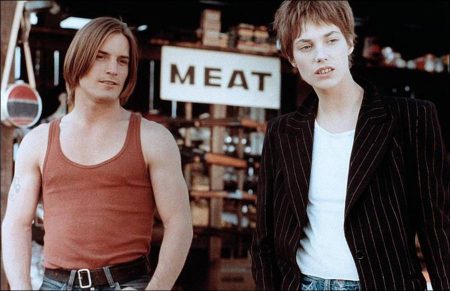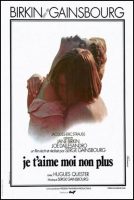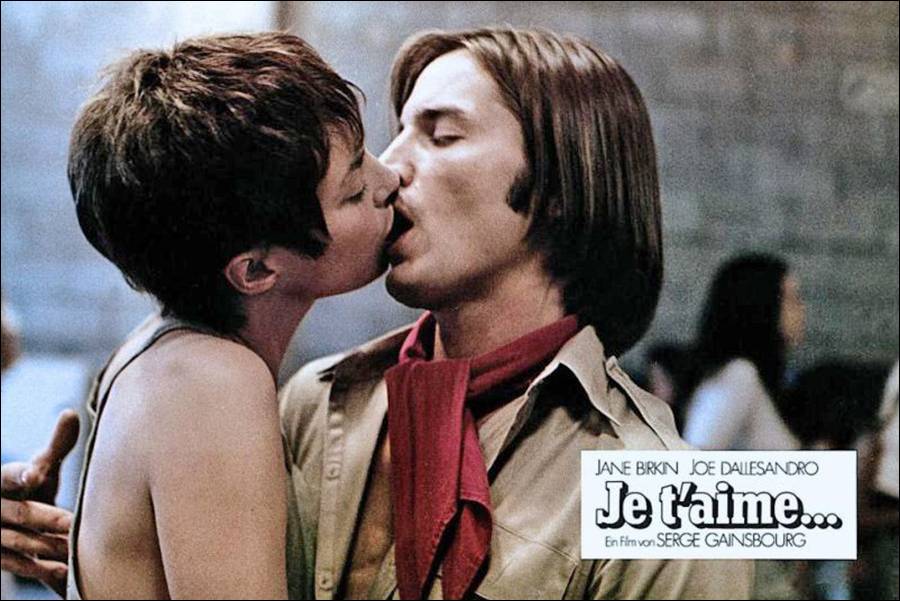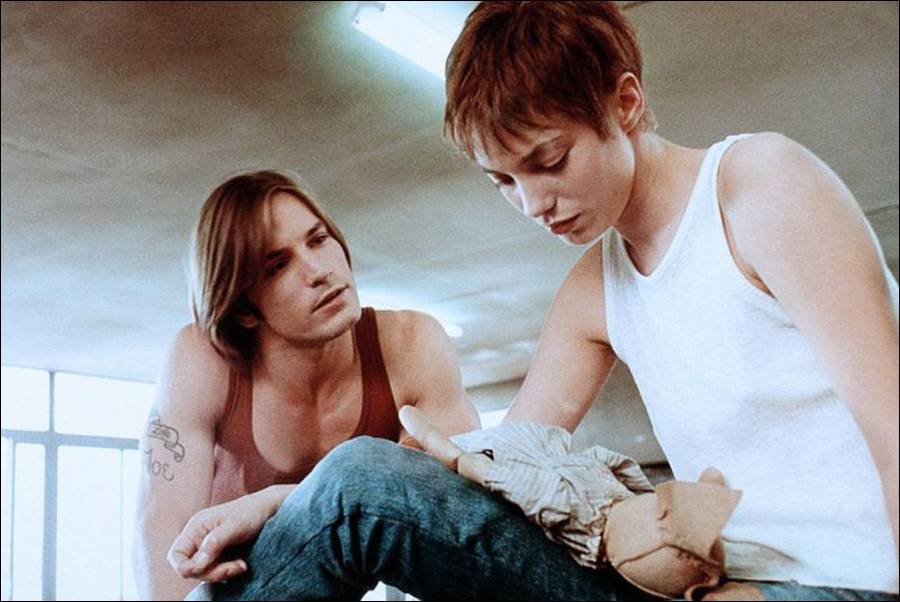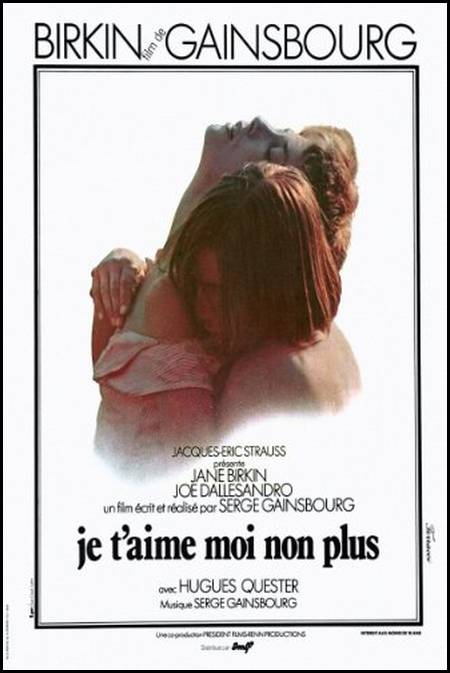Je T’aime Moi Non Plus movie storyline. The homosexual garbage truck driver Krassky (Joe Dallesandro) and his partner Padovan (Hugues Quester) stop at an isolated restaurant near the landfill where they work to drink a beer. They are served by the waitress Johnny (Jane Birkin) and she explains that the sleazy owner Boris (Reinhard Kolldehoff) zhas given that nickname to her since she wears short hair and has small breasts. Her tomboy style attracts Krassky and she has a crush on him. Boris warns her that Krassky is gay but Johnny dates him. When they go to bed, Krassky fails; however, when he sees her laying down on her face, he gets excited and sodomizes her. They start an unusual relationship while Padovan gets jealous.
Je T’aime Moi Non Plus (English title: I Love You, I Don’t) is a 1976 feature film written, directed, and scored by Serge Gainsbourg, starring Jane Birkin, Hugues Quester and Joe Dallesandro, and featuring a cameo by Gérard Depardieu. He has a few short appearances, playing a passing cynical gay local.
Je T’aime Moi Non Plus was the first film directed by Gainsbourg. Jane Birkin was his partner at that time. It includes elements of symbolism recurrent in Gainsbourg’s work: passion to the death and uncensored eroticism. Starring are Jane Birkin, Joe Dallesandro, Hugues Quester, Liliane Rovère, Gérard Depardieu, Michel Blanc, Josiane Lévêque, Claudia Butenuth, David Gabison, Sharon Glory and Arlette Emmery.
Gainsbourg made his directorial debut with a feature film of the same name, which is being re-released by Kino Lorber in a new 4K restoration. Starring Birkin alongside Warhol superstar Joe Dallesandro, it chronicles the unlikely love that blooms between a gay truck driver and a waifish truck stop waitress — and the difficulties they have in consummating it. Like the infamous song from which it takes its name, Je T’Aime Moi Non Plus is an unapologetically explicit ode to physical love, rendered cinematic thanks to Gainsbourg’s keen eye and the unique charms of Birkin.
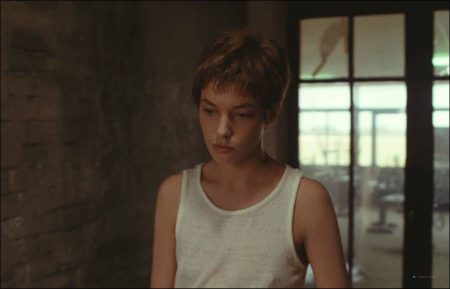
Film Review for Je T’aime Moi Non Plus
Ever since its high-profile release in the mid-1970s, Je
T’aime Moi Non Plus is a film that has divided critical opinion. It is the first film to be directed by Serge Gainsbourg, the iconic French musician and singer who achieved fame and notoriety throughout much of the 1960s and 1970s. Outside of France, he is probably best known for his 1968 hit pop song, Je T’aime Moi Non Plus (from which the idea of this film was developed), which featured Gainsbourg’s then lover Jane Birkin simulating an orgasm.
The song was originally banned in many countries across Europe including the UK – but subsequently became a hit when it was released (reaching Number One in the UK popular music charts for 1969). If the song was provocative, the film of the same name was more so – a grimly nihilistic depiction of sexual gratification involving a gay man and a boy-like young woman getting it together anal-wise. Clearly, not the kind of film that would appeal to the Jane Austen brigade.
Whilst the film has been unfairly rubbished in some quarters, some of the criticism of Je T’aime Moi Non Plus is entirely justified. A mediocre script is made unbearable in a few places by some bad acting. The pace of the film is uneven and at times the film does resemble too much a tacky piece of 1970s soft core porn. The film’s subject matter is equally off-putting – it portrays gay men in a generally bad light, fuelling the then prevailing homophobic prejudices, and its depiction of sex as something that is ugly and destructive is not something that the average cinemagoer would be likely to stomach. It has all the failings you would expect in a first film, and then perhaps a few more.
And yet there is something that is strikingly truthful and alluring about this film. Its depiction of the sexual game – attraction, union and then separation – is certainly brutal, unconventional and uncomfortable to watch, but it is presented to us with conviction and sincerity. Sex is not, as cinema and literature would have us believe, always a thing of immense beauty. It can also be grotesque, demeaning and crude, horrifyingly destructive, an irresistible force that ruins its victims, turns their lives inside out and leaves an indelible stain.
In this film, Gainsbourg isn’t celebrating the beauty of love, he is showing us the rarely talked about flipside. Whilst his work as a director in no way matches up to his talent as a musician, he does manage to bring a certain poetry to the film – the bleak, dusty location (evocative of the American mid-west) perfectly underscoring the emptiness of the doomed romantic liaison. It’s a stark, demanding film, flawed in so many ways, yet strangely potent and lyrical, and with a few touches of artistic brilliance. In an age when the subject matter of the film is less likely to cause offence, Je T’aime Moi Non Plus is a film which merits a serious critical reappraisal.
Je T’aime Moi Non Plus (1976)
Directed by: Serge Gainsbourg
Starring: Jane Birkin, Joe Dallesandro, Hugues Quester, Liliane Rovère, Gérard Depardieu, Michel Blanc, Josiane Lévêque, Claudia Butenuth, David Gabison, Sharon Glory, Arlette Emmery
Screenplay by: Serge Gainsbourg
Production Design by: Théobald Meurisse
Cinematography by: Willy Kurant
Film Editing by: Kenout Peltier
Costume Design by: Jeannette Descamps
Makeup Department: Fernande Hugi, Ava Monneret
Music by: Serge Gainsbourg
MPAA Rating: None.
Distributed by: AMLF (France)
Release Date: March 10, 1976 (France)
Views: 722
